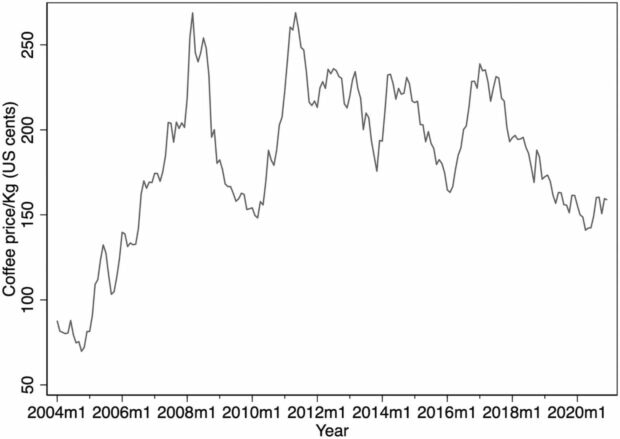International robusta coffee prices. The international robusta coffee price is shown in US$/kg for the period 2004–2020. This is based on data from the International Coffee Organization. Image shared via CC BY-NC-ND 4.0 license. See the original here.
A recent public health study found that income uncertainty, particularly in the context of volatile coffee prices, negatively impacts the mental health of smallholder coffee farmers.
After studying small-scale coffee farmers in Vietnam, the world’s second-largest coffee producing country, the researchers suggested the results may be applicable to populations in other low- and middle-income countries that rely significantly on commodity-price-driven agricultural exports.
“Our results suggest that not only poverty, but also the risk of poverty caused by fluctuating prices has a significant additional negative effect on the mental well-being of farmers in low-income countries,” Finn Tarp, a professor at the University of Copenhagen and coordinator of the Development Economics Research Group (DERG) said in an announcement of the publication.
Tarp and Saurabh Singhal of Lancaster University (UK) co-authored the study, which was recently published in the American Journal of Agricultural Economics, a publication of the Agricultural and Applied Economics Association.
“Coffee flowers” by Okkisafire is licensed under CC BY-SA 4.0.
Commodity coffee prices have experienced extreme volatility since the collapse of an internationally established quota system more than three decades ago. Smallholder coffee farmers are particularly vulnerable to price volatility, according to numerous studies.
The researchers behind the new study found that price volatility correlated with a 12.3% to 15% increase in depressive symptoms among Vietnamese coffee farmers.
“The perennial nature of coffee trees, which have a lifespan of over 50 years, means that farmers cannot quickly switch to other crops in response to price fluctuations,” the authors wrote. “This inflexibility leaves them exposed to the volatile international commodity markets.”
Smallholder coffee farmers experiencing price volatility were found to have more pessimistic expectations of future economic well-being, increased cognitive load, higher alcohol consumption and reduced social capital.
According to the authors, the study’s findings align with broader literature on economic uncertainty, showing that income instability can lead to adverse mental health outcomes. The authors urged government intervention regarding coffee prices in order to attempt to improve mental health outcomes and public health among farmers.
Said Tarp, “Governments should consider introducing policies that stabilize farmers’ incomes, for example by offering price insurance or increasing access to market-based risk management.”
Find the full study here.
Comments? Questions? News to share? Contact DCN’s editors here.
Related Posts


